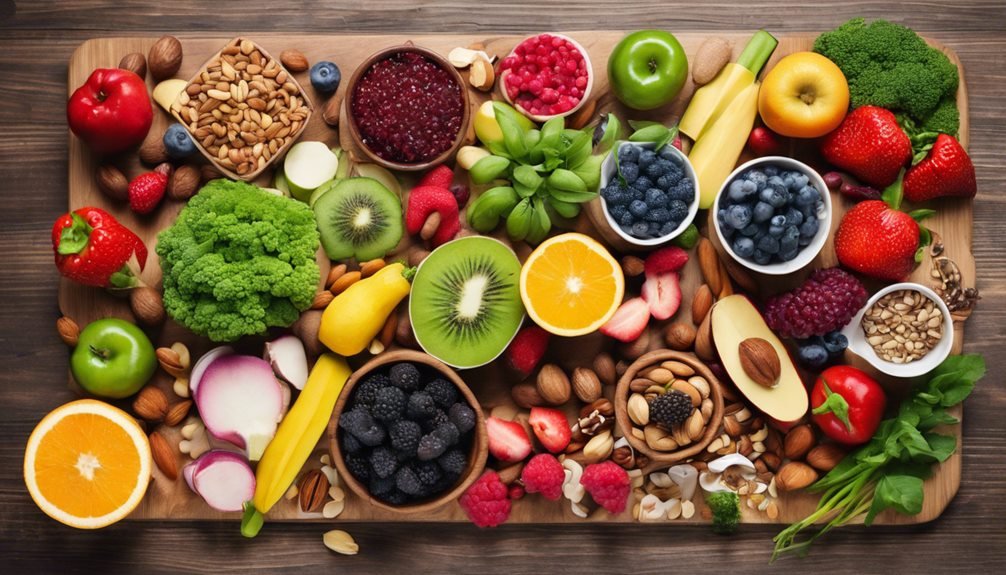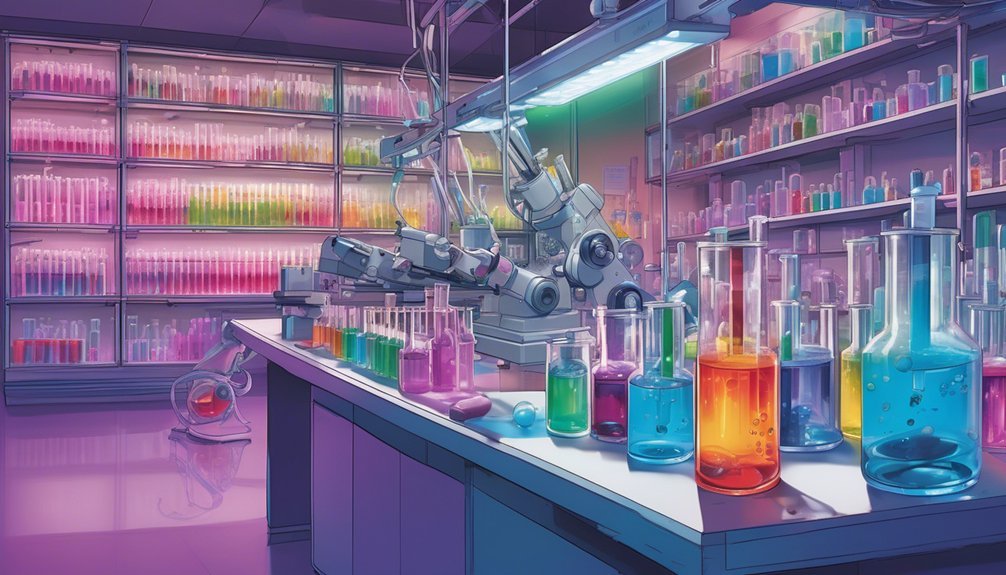Did you know that dairy consumption has been linked to an increased risk of certain types of cancer? By exploring the potential benefits of adopting a dairy-free diet, you might discover a compelling connection between dairy intake and cancer prevention. Consider how making small changes in your dietary habits could potentially impact your overall health and well-being.
Key Takeaways
- Dairy-free diets may reduce cancer risk by avoiding potential carcinogens and hormone disruptors found in dairy.
- Plant-based alternatives provide essential nutrients without the drawbacks of dairy consumption.
- High dairy intake linked to increased cancer risk due to saturated fats, cholesterol, and hormonal influences.
- Dairy-free options support overall health by offering antioxidant-rich, vitamin-packed alternatives.
- Understanding dairy's impact on hormones and insulin levels is crucial in evaluating individual cancer risk factors.
Dairy Consumption and Cancer Risk
Research studies have shown a potential link between dairy consumption and cancer risk. While dairy products provide essential nutrients like calcium and vitamin D, excessive intake may pose risks. Some research suggests that high dairy consumption could be associated with an increased risk of certain cancers. To reduce your risk, consider incorporating dairy substitutes into your diet.
Plant-based alternatives like almond milk, soy yogurt, and cashew cheese can provide similar nutrients without the potential drawbacks of dairy.
When focusing on cancer prevention, it's essential to consider the overall balance of your diet. While dairy products can be a part of a healthy diet, moderation is key. Opting for dairy substitutes can be a proactive step in reducing your cancer risk while still meeting your nutritional needs. Remember to consult with a healthcare provider or a dietitian to ensure that your dietary choices align with your health goals and individual needs.
Types of Cancer Linked to Dairy
Certain types of cancer have been associated with dairy consumption, raising concerns about the potential impact of dairy products on cancer risk. Breast cancer is one of the most studied types of cancer in relation to dairy intake. Research suggests that high consumption of dairy products, particularly in adolescence, may increase the risk of developing breast cancer later in life. The exact mechanisms behind this association aren't yet fully understood but could be related to the hormones present in dairy or the insulin-like growth factor 1 (IGF-1) found in milk.
Prostate cancer is another type of cancer that has been linked to dairy consumption. Studies have indicated that diets high in dairy products, especially whole milk and high-fat dairy, may be associated with an increased risk of prostate cancer. The potential impact of dairy on prostate cancer risk could be due to the calcium content in dairy products, which has been suggested to influence prostate cancer development.
Understanding the associations between dairy consumption and these specific types of cancer can help individuals make informed decisions about their dietary choices to potentially reduce their cancer risk.
Potential Benefits of Dairy-Free Diets
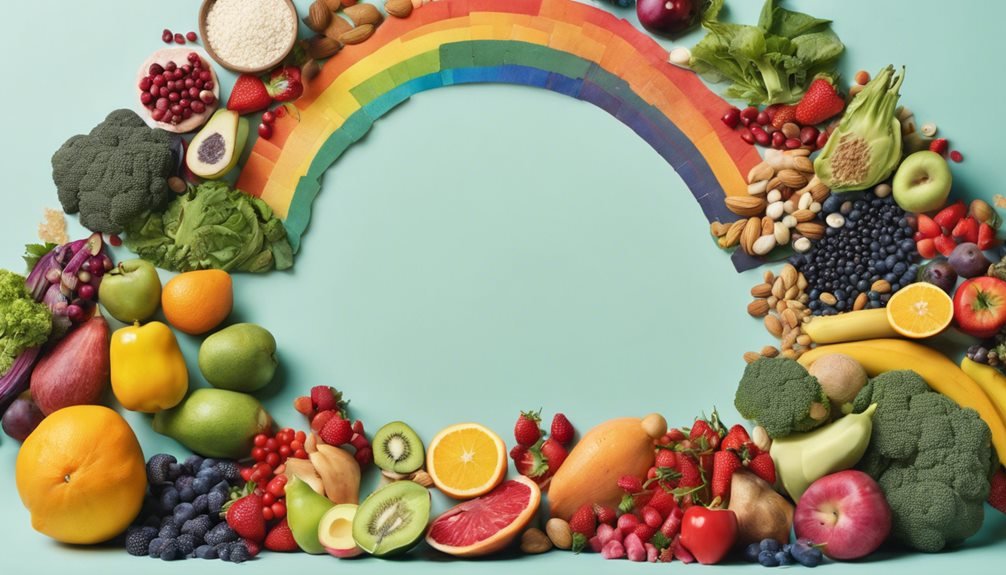
The link between dairy consumption and certain types of cancer underscores the importance of considering alternative dietary choices. Opting for a dairy-free diet can offer various nutritional benefits that support overall health and potentially aid in cancer prevention. Dairy alternatives like fortified plant-based milks, tofu, nuts, and seeds can provide essential nutrients such as calcium, vitamin D, and protein without the potential drawbacks associated with dairy consumption. These nutrient-rich options can contribute to a well-rounded diet that supports a healthy immune system, which plays a crucial role in fighting off cancer cells and supporting overall wellness.
Impact on Cancer Prevention
To effectively reduce your risk of cancer, adopting a dairy-free diet can play a crucial role in cancer prevention. The nutritional impact of dairy-free diets on cancer prevention lies in the avoidance of potential carcinogens found in dairy products, such as hormones and growth factors. Epidemiological evidence suggests that high dairy consumption may be linked to an increased risk of certain cancers, including prostate and breast cancer.
By eliminating dairy from your diet, you may reduce your intake of saturated fats and cholesterol, which are associated with an elevated risk of cancer development.
Furthermore, dairy-free diets typically promote the consumption of more plant-based foods rich in antioxidants, vitamins, and minerals that have protective effects against cancer.
Impact on Cancer Treatment
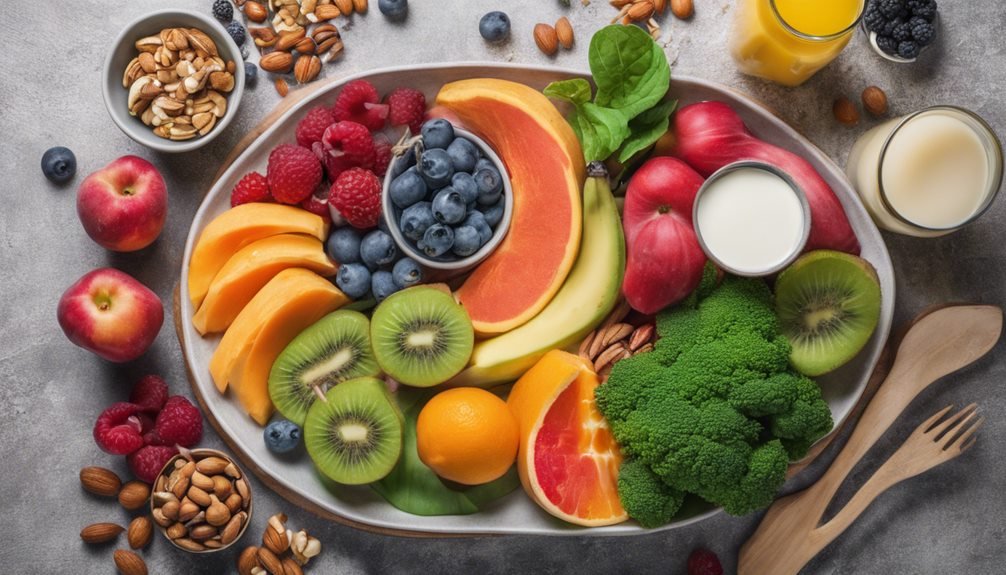
Adopting a dairy-free diet during cancer treatment can have significant implications for patient outcomes and overall well-being. Research suggests that dietary changes, such as eliminating dairy, can play a crucial role in enhancing treatment effectiveness and providing nutritional support to cancer patients.
Impact of Dairy-Free Diet on Cancer Treatment
| Benefits | Explanation |
|---|---|
| Enhanced Treatment Efficacy | Dairy-free diets can reduce inflammation, potentially improving response to treatment. |
| Improved Nutritional Support | Dairy alternatives can provide essential nutrients needed for recovery and overall health. |
| Reduced Side Effects | Eliminating dairy may help minimize gastrointestinal issues common during cancer treatment. |
| Enhanced Immune Function | Non-dairy options can support immune health, crucial for battling cancer cells. |
| Increased Overall Well-being | A dairy-free diet can promote better energy levels and quality of life during treatment. |
Dairy and Hormonal Cancers
When considering the relationship between dairy consumption and hormonal cancers, it's essential to examine how dairy products may impact hormone levels and cancer risk. Hormonal regulation plays a crucial role in cancer progression, particularly in hormone-sensitive cancers such as breast and prostate cancer.
Dairy contains hormones like estrogen and insulin-like growth factor 1 (IGF-1), which have been associated with promoting cancer cell growth and proliferation in some studies.
Research suggests that high dairy consumption may lead to increased levels of these hormones in the body, potentially fueling the growth of hormone-sensitive tumors. By reducing dairy intake, individuals may help regulate their hormone levels, which could in turn lower the risk of hormone-related cancers.
Understanding the impact of dairy on hormonal regulation is vital in cancer prevention strategies, as it provides insights into how dietary choices can influence cancer progression. Making informed decisions about dairy consumption may offer a proactive approach to managing cancer risk, especially for individuals concerned about hormonal cancers.
Dairy and Inflammation
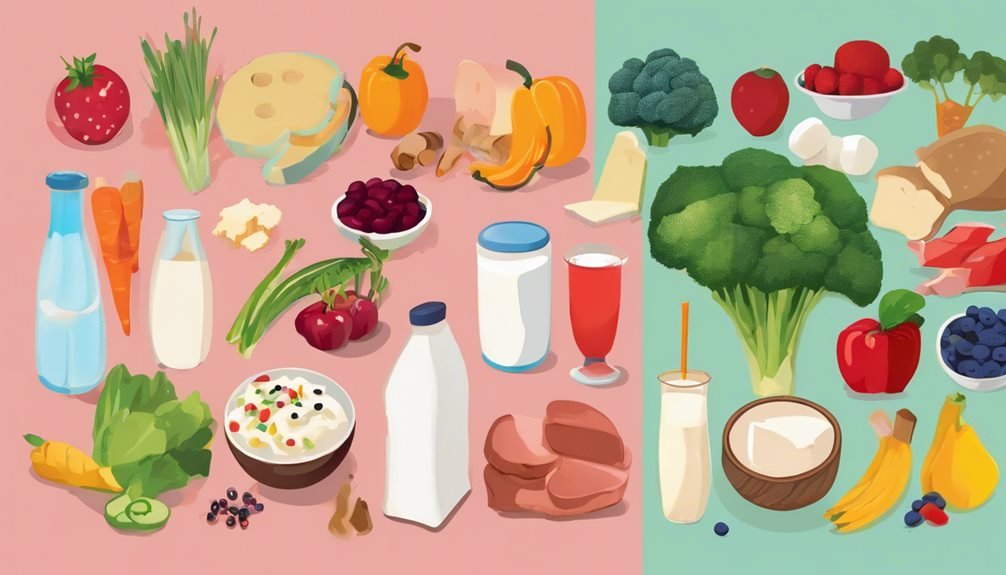
Exploring the relationship between dairy consumption and inflammation reveals a complex interplay within the body's immune response system. Dairy products have been linked to potential impacts on gut health and immune function. The gut plays a crucial role in regulating inflammation throughout the body. Dairy consumption can influence the gut microbiota composition, which in turn can affect the immune system's response.
Studies suggest that some individuals may experience increased inflammation in the gut due to dairy consumption, potentially leading to systemic inflammation in the body. This chronic low-grade inflammation has been associated with various health conditions, including cancer.
Furthermore, dairy products contain certain proteins that might trigger an immune response in some individuals, exacerbating inflammation. Understanding the relationship between dairy, gut health, and immune function is essential in comprehending how dietary choices can influence inflammation levels in the body.
For those considering a dairy-free diet as part of cancer prevention or management, these insights highlight the importance of personalized nutrition choices for optimal health outcomes.
Dairy and Insulin-like Growth Factor (IGF)
Investigating the connection between dairy consumption and Insulin-like Growth Factor (IGF) levels provides valuable insights into how dietary choices may impact cancer risk. Dairy products contain growth hormones, which can influence the body's insulin levels and subsequently affect IGF production. Here are some key points to consider:
- Increased IGF Levels: Consuming dairy products may lead to higher levels of IGF in the body, potentially promoting cancer cell growth.
- Hormonal Imbalance: The growth hormones present in dairy can disrupt the body's natural hormone balance, which is crucial for overall health.
- Insulin Sensitivity: Dairy consumption can impact insulin sensitivity, potentially contributing to conditions that are linked to cancer development.
- Risk Assessment: Understanding how dairy influences IGF and insulin levels is essential in evaluating individual cancer risk factors and making informed dietary choices to support overall well-being.
Being mindful of the relationship between dairy, growth hormones, and insulin levels can empower you to make informed decisions about your diet and potentially reduce cancer risk.
Calcium and Cancer Connection
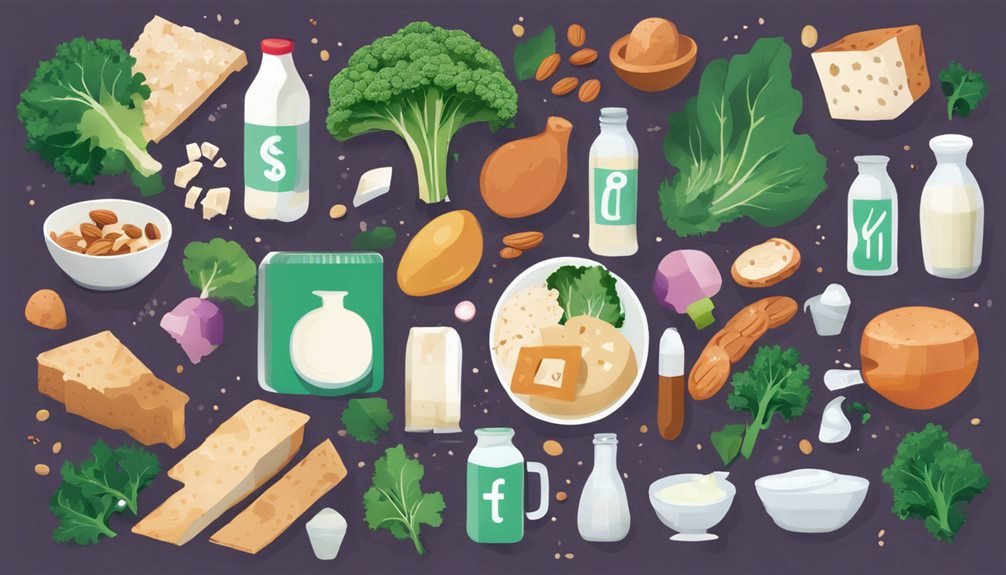
Understanding the role of calcium in relation to cancer development is paramount in comprehending the intricate interplay between dietary components and health outcomes. Adequate calcium intake is essential for various physiological functions, including bone health and muscle contraction. However, research suggests a potential link between high calcium intake, particularly from dairy sources, and an increased risk of certain cancers, such as prostate cancer. This association has led many individuals to explore dairy substitutes to reduce their calcium intake from traditional sources.
When considering dairy substitutes, it's crucial to opt for alternatives that provide sufficient calcium while also meeting other nutritional needs. Plant-based milk alternatives fortified with calcium can be a suitable option for maintaining adequate calcium levels without relying on dairy products.
Additionally, incorporating calcium-rich foods like leafy greens, almonds, and fortified cereals into your diet can help meet your calcium requirements while minimizing potential risks associated with high dairy consumption. By making informed choices about calcium intake and dairy substitutes, you can support your overall health and potentially reduce cancer risk.
Vitamin D and Cancer Prevention
Vitamin D plays a crucial role in cancer prevention, with research indicating its potential impact on reducing the risk of various types of cancers. Adequate levels of Vitamin D in the body are essential for maintaining a healthy immune system and regulating cell growth, both of which are crucial in preventing cancer progression. Here are some key points to consider regarding Vitamin D and cancer prevention:
- Vitamin D deficiency can increase the risk of cancer development.
- Vitamin D helps regulate cell growth and prevent abnormal cell division.
- Adequate levels of Vitamin D support a healthy immune system, which plays a vital role in fighting cancer.
- Research suggests that maintaining optimal Vitamin D levels may reduce the risk of various types of cancers, including breast, colon, and prostate cancer.
Ensuring that you have sufficient Vitamin D levels through sunlight exposure, fortified foods, or supplements can be a proactive step in reducing your risk of cancer.
Dairy Alternatives for Cancer Patients
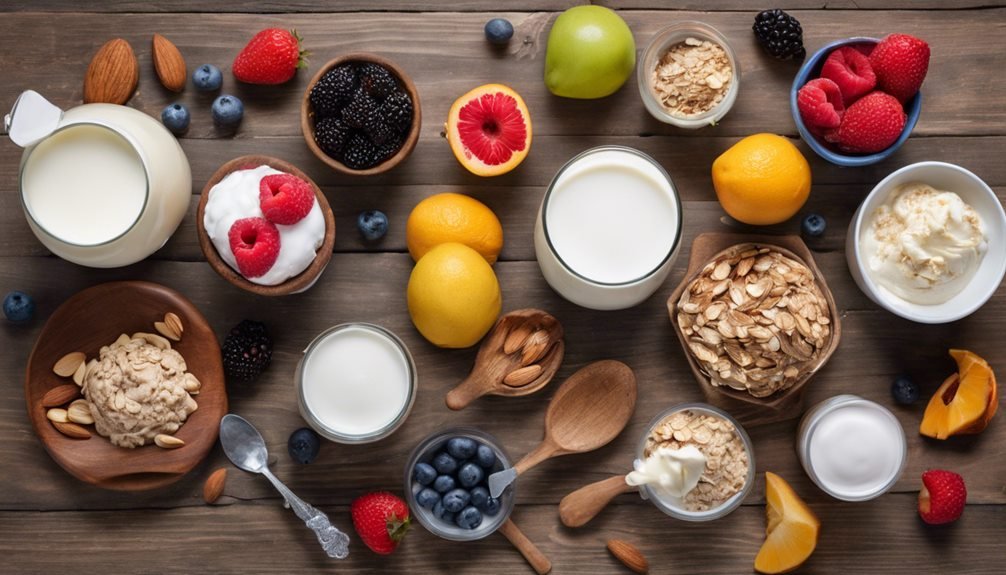
For cancer patients looking to explore dietary alternatives, considering dairy-free options can be beneficial in managing their health and well-being. When seeking dairy substitutes, it's crucial to ensure that essential nutritional needs are met. Dairy alternatives such as almond milk, soy milk, coconut milk, and oat milk can provide adequate levels of calcium, vitamin D, and protein that are typically found in dairy products.
Almond milk, enriched with calcium and vitamin D, can be a suitable replacement for cow's milk.
Soy milk offers a good source of protein and can be fortified with calcium and vitamin D to support bone health.
Coconut milk is rich in medium-chain triglycerides and can be a flavorful dairy substitute in various dishes.
Oat milk, known for its creamy texture, can provide a source of fiber and essential nutrients.
Tips for Going Dairy-Free
If you're considering transitioning to a dairy-free diet, there are several practical tips that can help you navigate this dietary change successfully. Making this shift can have significant health benefits, especially for those fighting cancer. Here are some tips to help you go dairy-free smoothly:
- Explore Dairy Substitutes: Experiment with various dairy substitutes like almond milk, coconut milk, soy milk, and cashew cheese to find alternatives that suit your taste preferences.
- Read Labels Carefully: Be vigilant about checking food labels for hidden dairy ingredients, as many processed foods contain dairy in different forms.
- Plan Your Meals: Take the time to plan your meals in advance to ensure you have dairy-free options readily available and avoid the temptation to revert to old habits.
- Seek Support: Connect with online communities or support groups to share experiences, recipes, and tips with others who are also transitioning to a dairy-free diet.
Frequently Asked Questions
Can Dairy-Free Diets Completely Prevent Cancer?
While dairy-free diets can contribute to a healthy lifestyle, it's essential to understand that no single dietary change can completely prevent cancer. The focus should be on a well-rounded diet rich in fruits, vegetables, whole grains, lean proteins, and dairy substitutes if needed. Incorporating a variety of nutrient-dense foods and maintaining a healthy weight are key factors in cancer prevention.
It's always advisable to consult with healthcare professionals for personalized recommendations.
Are There Specific Dairy Alternatives That Boost Cancer Treatment?
When exploring dairy alternatives for boosting cancer treatment, it's essential to consider their nutritional benefits and treatment efficacy. Almond milk, for example, offers a rich source of calcium and vitamin D, crucial for bone health during cancer therapy. These nutrients aid in maintaining overall health and supporting the body's response to treatment. Incorporating such dairy alternatives can enhance the nutritional profile of cancer patients and potentially improve treatment outcomes.
How Does Dairy Consumption Affect Inflammation in Cancer Patients?
When it comes to managing inflammation in cancer patients, dairy consumption can play a role. Studies suggest that dairy may contribute to inflammation due to certain proteins and saturated fats.
Cancer patient diets should consider dairy alternatives to help reduce inflammation levels. Substituting dairy with plant-based options rich in antioxidants and anti-inflammatory properties can be beneficial for managing inflammation in cancer patients.
Always consult with a healthcare provider for personalized dietary recommendations.
Is Vitamin D Supplementation as Effective as Dairy for Cancer Prevention?
Vitamin D benefits are well-documented in cancer prevention. Studies show that supplementation can be as effective as dairy in reducing cancer risk. Adequate vitamin D levels have been linked to lower rates of certain cancers.
While dairy consumption can provide vitamin D, supplementation offers a more direct approach to ensuring optimal levels for cancer prevention. Discuss with your healthcare provider about incorporating vitamin D supplements into your routine for potential cancer prevention benefits.
Can Dairy-Free Diets Impact the Progression of Existing Cancers?
When considering the impact of dairy-free diets on cancer growth, it's essential to focus on dairy substitutes. These alternatives can influence various mechanisms that may affect cancer progression.
Research suggests that certain dairy substitutes contain bioactive compounds, like phytochemicals, that could potentially inhibit cancer cell growth. By incorporating these substitutes into your diet, you may be able to create an environment less conducive to cancer development.
Conclusion
In conclusion, opting for a dairy-free diet can have a significant impact on reducing cancer risk. Research shows that high dairy consumption, especially of products containing hormones and saturated fats, may increase the likelihood of developing certain types of cancer. By choosing dairy alternatives and focusing on essential nutrients like calcium and vitamin D, individuals can support their immune system and potentially lower their risk of hormonal cancers. Making informed dietary choices is a powerful tool in the fight against cancer.
